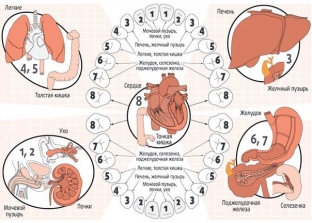The symptoms of diseases of the internal organs are not always transparent and understandable, especially if such diseases are in the initial stages. There are a large number of disease indicators that will tell you about a problem in a particular organ. Alternative medicine believes that one of these indicators are teeth, each of which is associated with certain internal organs and, accordingly, can suggest its dysfunction. If you tend to be attentive to your health, you can take note of this method.
Teeth – internal organs in the oral cavity
Like skin, teeth are connected to the internal organs of a person. Therefore, problems with certain teeth may indicate the presence of diseases of the internal organs corresponding to a particular tooth.
- Incisors (upper and lower):
internal organs – kidneys, bladder, reproductive system and ears.
diseases – pyelonephritis, otitis media, tonsillitis, cystitis, prostatitis, osteochondrosis.
- Fangs:
internal organs – liver and gallbladder.
diseases – cholecystitis, hepatitis.
- Small molars (premolars):
internal organs: large intestine, lungs.
diseases – bronchitis, pneumonia, dysbacteriosis, colitis, allergy.
- Large molars:
internal organs – stomach, spleen, pancreas.
diseases – pancreatitis, gastritis, ulcer, anemia, tonsillitis, sinusitis, atherosclerosis, varicose veins, problems of the endocrine system.
- Wisdom Teeth:
internal organs – cardiovascular system, small intestine;
diseases – ischemic disease, heart disease.
- Gums:
Gingivitis can indicate breast pathology in women and leukemia in children.
For more details on the relationship between teeth and internal organs, see the picture below.
Does the condition of the teeth affect the internal organs?
The connection of teeth with internal organs can be called bilateral, i.e. Dental problems can lead to problems in various organs and parts of the body. For example:
toothache can cause headache (fangs and incisors – in the forehead and temples, indigenous – in the back of the head);
caries – possible cause of migraine;
gum disease can lead to cardiovascular disease;
pulpitis can cause gastritis, colitis and cholecystitis.
Inflammation of any tooth can lead to the spread of infection throughout the body. If a person has chronic diseases, dental problems (inflammation, caries, gum disease) can lead to an exacerbation of such diseases.
In addition, caries damage to certain teeth may indicate the presence of certain diseases, for example:
if the sixth and 1, 2, 3 frontal teeth are affected, they indicate a violation of the function of the gastrointestinal tract and liver in children, 6 and 7 – in adults;
1, 2 teeth are affected if children have problems with adenoids, tonsils, polyps;
1,2 teeth in adults are affected due to pneumonia, asthma, bronchitis;
Teeth 5 and 6 are affected in adults due to urinary problems.
Our body is a collection of interconnected organs. When one or another part of the body fails, another part of it can react quite painfully to such changes. Connection of teeth with internal organs – one example of such a relationship.







Add a comment